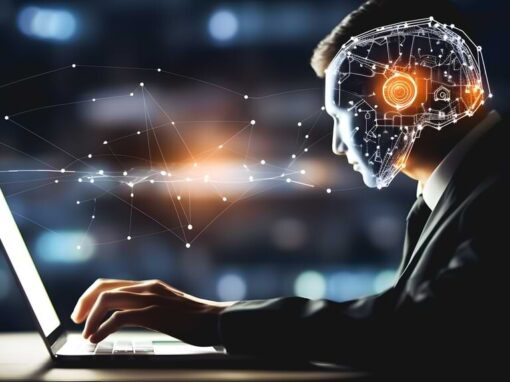Generative AI is making its way into every sector, including event communications. Is this the promise of a technological revolution or just a passing fad? Professionals are not short of enthusiasm, but on the ground, the spectacular transformations announced are still struggling to materialise. And yet a more discreet - but just as decisive - revolution is underway. It is gradually reshaping the way in which events are designed and organised. So, is AI in the process of revolutionising the events industry, without us even realising it? What tools should be used, and for what purposes? Find out from Régis Clinquart, copywriter, scriptwriter and trainer specialising in event communications and artificial intelligence.

If many event professionals are to be believed, AI is set to revolutionise the sector. However, there are still very few concrete examples of this revolution in the making.
Why? Because, despite the impressive performance of generative AIs such as ChatGPT, HeyGen, Kling and Midjourney, the many activities linked to the design, organisation and production of events to which they can contribute to a greater or lesser extent are not the most spectacular. On the contrary, most of them are part of the indispensable but much more confidential work that goes on behind the scenes..
The reason for this astonishing paradox? With a few exceptions, IAGs are designed to interact with a single user at a time, and not with groups.
By definition, they only offer human-machine interaction, whereas the vast majority of events are based on human interaction (participants interact with speakers, exhibitors, artists and even each other) and on shared emotion and the construction of collective memories.
In reality, the most decisive contributions of AI in the field of event communication concern not so much the organisation of events (although it can contribute to this) as their preparation and optimisation, for both participants and organisers. We can rightly speak of a revolution, but it is a revolution that is, for the most part, invisible.
AI for greater productivity
Whether it's writing minutes of meetings, transcribing interviews, scripting speeches from simple note-taking, creating an event schedule, quizzes or satisfaction surveys, formatting the elements of a client presentation or automating briefings for service providers... AIs don't necessarily work better than humans, but they do it much faster and with less effort. On the audiovisual and media production side, AIs also make it possible to chop up videos at record speed and (as everyone now knows) to create visuals, generate moodboardsWe can even create voice-overs and music very quickly and cost-effectively.
Examples of productivity tools
- To transcribe meetings and take minutes: Dicte, Noota, Noty, Fireflies, Whisper...
- To automatically script oral presentations : Event Editor
- To create an event timeline : Event Agenda Generator
- To automate service provider briefings : Rédac Brief
- To delete videos : Opus Clip, Jumpers media intelligence functionAdobe Premiere
- To generate images : Midjourney, ChatGPT, Flux, Ideogram...
- To create videos : Veo, Runway, Kling, Hailuo, Higgsfield, Domo...
- To clone voices, create voice-over and sound effects : ElevenLabs
- To create music with lyrics : Suno and Udio
AI as a super-assistant
AIs make it easy to carry out documentary research... but not without making many mistakes that need to be corrected.
They can summarise, translate and correct documents, extract information from them and organise it (NotebookLM).
They can carry out strategic and information monitoring, analyse a customer brief (Xpert Event Customer Brief), reduce the duration of an intervention, play a critical role (Crash Test Event formulate objections to customer recommendations and help respond to them), propose plan Bs, create a media plan, write and format all kinds of post-event publications.
Finally, on the production and logistics side, AIs can compare quotes (Compare Event quotes), advising on technical solutions (Event Tech Advisor), find service providers or speakers (Speaker Search), finding event venues and destinations, combining time zones, optimising the flow and distribution of participants, providing them with information and guidance.
AI to boost creativity
RNs can suggest and develop themes for the evening, ideas for workshops (Workshop Designer), events, teambuildings (Team Builder) and icebreakers (Icebreaker).
They allow us to explore the possibilities of scenography (ScenoStarter).
Used to good effect, they excel at storytelling, scripting sketches, writing shows and videos (Video Script) and songs, as well as in the generation of teasers (Teaser Maker).
AI as a (still imperfect) substitute for human expertise
The most spectacular and visible advance in terms of "expertise replacement" is certainly in the field of automatic simultaneous translation (including audio with Interprefy for example).
But AI can also take care of a large number of automated editorial tasks, such as writing invitations (Invit'Event), or conduct qualitative analyses of satisfaction surveys and draw out actionable lessons (Stud'Event).
AI for unprecedented new uses
In addition to the numerous use cases mentioned above, AIs are making possible what was not possible just yesterday:
- upscaling of images and videos to improve resolution (Topaz, Magnific AI, Lupa )
- creation of customised participant pathways
- highly sophisticated matchmaking
- lip-synchronised multilingual audio dubbing of speakers (HeyGen)
- creation of realistic avatars and audio and video deepfakes (ElevenLabs, Hedra, Pixverse, Krea, Sync...)
- personalisation of videos by voice synthesis (HeyGen)
- automatic creation of podcasts (Notebook LM) or videos (Invideo, Pictory)
- designing "augmented" workshops and teambuildings
- setting up original events such as AI blind tests, AI photocalls with image generation, virtual interventions without mocap, icebreakers based on emotion recognition, etc.
- creation of innovative collaborative AI animations based on coprompting
- automatic extraction and publication of videos as they are shot (Opus Clip, Spikes)
- facial recognition photo distribution (Memento)
- etc.
Summary: use cases at every level
| Domains | AI applications |
| Audiovisual creation | Video, graphics, illustration, sound and music |
| Copywriting/design | Documentation, ideation, editing, translation |
| Project follow-up | Summary, analysis, reporting |
| Production | Venues and service providers, logistical and technical solutions, cost study |
| Scriptwriting | Script, storytelling |
| Communication | Invitations, programmes, AI chatbots, newsletters, post-event |
| Interaction/animation | Quizzes, games, icebreakers, workshops, teambuildings, matchmaking |
Read also
Which AI should you choose for your work? Take the test!
The ORSYS editorial team invites you to find out which AI is best suited to your professional needs. Discover the most relevant AIs in a fun way with this quiz.
Are we heading for the scheduled disappearance of event expertise?
It's THE question that's on the minds of professionals in the events industry, as well as those in other sectors. And it's a legitimate question, whether we like it or not.
While the jobs on the ground - host, caterer, sound, lighting and video technician, stage manager, decorator, roadie, performing artist, etc. - do not seem to be threatened in the short term by competition from AIs (at least until advances in robotisation change the situation), the same cannot be said of the 'intellectual' jobs upstream.
AI can boost the analytical, strategic, creative, editorial and organisational skills of designers, copywriters, project managers, art directors, roughmen, directors, translators and logisticians, enabling them to complete many tasks faster and more efficiently... but it can also replace them, at least in part.
For the latter, AI is, despite its merits but also because of them, a danger.
And it would be a mistake for agencies to believe that they will win out by replacing human expertise, because their clients will also gradually bring this same threat to bear on them.
Indeed, the more the use of AI is democratised in companies as well as in the personal daily lives of clients, the more the latter will be inclined to exploit the pretext of AI to exert pressure on production costs, with a very strong potential impact on turnover as well as on agency margins...
How can agencies prepare and defend themselves against this risk?
First of all, since AI saves time, among other things, it will be necessary to separate the question of remuneration from that of time spent (except for field jobs).
To preserve their margins, agencies will have to stop selling man-days and start selling a result, and only a result: "You entrust me with such and such an assignment. The price is fixed and it costs so much".
But that won't be enough.
Because when a supplier's hourly productivity increases, the customer naturally expects - and demands - that these gains translate into lower costs. And more often than not, this can be achieved by increasing competition.
With AI, which is often perceived as "magical", the client may even be tempted to replace the agency to carry out a number of so-called "low added value" tasks (or those considered as such): less work and therefore less budget for the agency...
Agencies will therefore have to demonstrate, tomorrow even more than yesterday, the superiority of their expertise over that of the client in many areas. They will have to convince people that the work will be better done (and worth the cost!) if they do it themselves, with or without AI, than if the client does it, assisted by AI.
To do this, they must :
- Demonstrate their creativity, rigour and in-depth knowledge of event-related issues and solutions.
- But they also need to train their teams very seriously in AI, so that the agency's output is at least equivalent to, but preferably much better than, the output of a client whose skills have been 'augmented' by AI.
Get trained!
Would you like to better understand, master and effectively use AI in your events projects? Discover the training programme AI at the service of event communication.
Key points:
- Understanding AI, its potential, how it works and its limits for the events industry
- Gaining in productivity
- Automate repetitive, time-consuming or low value-added tasks
- Nurture your creativity and increase your sources of inspiration tenfold
- Knowing which tools to choose and how to get the best results from them





